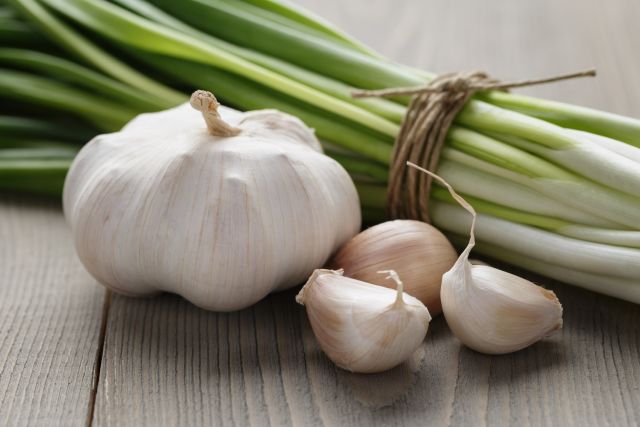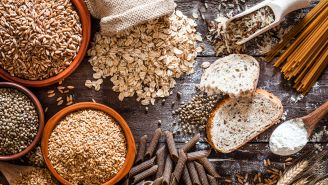Updated on July 10, 2023.
If you’re handy around the kitchen, you probably know that garlic is a pungent, flavorful, and versatile seasoning used in a range of cuisines. What you may not know is that it also possesses a powerful nutritional profile.
In fact, the herb—a member of the allium family of plants that includes onions, scallions, shallots, and leeks—has been used for centuries to help treat a wide range of ailments, and there’s some evidence behind those folk remedies. Research supports garlic’s use to help ease conditions including arthritis, cancer, infections, and heart disease.
Here’s what you need to know about this potent bulb and how to use it to its greatest effect.
Ease your arthritis
According to the Arthritis Foundation, garlic can be a smart nutritional pick for people who have joint inflammation issues like arthritis. It contains an anti-inflammatory compound called diallyl disulfide, which can counteract inflammation. In effect, eating garlic may help ease swelling in joints. It may also lower your risk of osteoarthritis by helping to protect the cushiony cartilage in your joints.
Boost your immune system
Garlic can help reduce inflammation across several body systems. Studies have shown that obesity is often linked to a higher risk of systemic inflammation, which can in turn weaken the immune system. But one 2018 study published in Clinical Nutrition ESPEN showed that adults with obesity who took garlic extract capsules for six weeks had better immune cell counts and less systemic inflammation than those who took a placebo.
Since compounds in garlic appear to help with immune cell counts, researchers have also investigated whether it may help treat or prevent cancer. A 2020 review published in Biomedicine & Pharmacotherapy found that when prepared in a way that preserves its active compounds, garlic may not only kill cancer cells and prevent them from spreading, but may also help stop dangerous free radicals from contributing to the development of cancer in the first place.
It's important to note that most of the studies that have looked at the anticancer potential of garlic have been done in laboratory samples or animals. While results may be encouraging, more research in humans needs to be done to be able to determine specific benefits and doses.
Kick your cold
A 2021 review of 31 studies published in Clinical Nutrition ESPEN found evidence that an anti-inflammatory diet that includes garlic can help reduce the symptoms and duration of respiratory infections like the flu.
An overall anti-inflammatory diet might include spices and seasonings like turmeric, ginger, and saffron, as well as foods rich in omega-3 fatty acids like fish. But the review cites garlic in particular as having potent antiviral properties. It also notes that more research is needed to better understand how garlic works in the body and how to use it for maximum effect.
Help your heart
Evidence shows that eating more garlic and other allium plants can lower your risk for cardiovascular disease.
"Studies do show that garlic may help protect your heart in a few different ways," says registered dietitian Janis Jibrin, MS, RD. "It's the sulfur-containing compounds in garlic that are protective. These are released when garlic is crushed or chopped. So get out the crusher and paring knife!"
A 2020 meta-analysis of 12 studies published in Experimental and Therapeutic Medicine suggested that garlic extract supplements may lower blood pressure as effectively as anti-hypertensive medications. The review also found that garlic supplements helped make arteries less stiff and more flexible, which helps keep blood flowing smoothly and blood pressure down. The researchers also found that garlic supplements had fewer side effects for most people than blood pressure medications.
If you have hypertension, consult with your healthcare provider (HCP) before trying garlic supplements, and never adjust your ongoing prescription without checking with your HCP.
How should you eat it?
Garlic has a strong flavor and it may not agree with your palate. If you’d prefer to take garlic in supplement form, choose aged garlic extract capsules, as this is what many studies have used. If you would like to include fresh garlic in recipes, just remember not to overcook it.
"Ideally, you should eat garlic raw, as in dishes like hummus or salsa, because cooking destroys some of the beneficial compounds," Jibrin says.
"When you do cook it, you can preserve some of the sulfur compounds by first chopping or crushing it, letting it sit for 10 minutes or more, and then adding it in the last few minutes of cooking."
For tasty recipes that include raw garlic, try making a simple and delicious hummus with parsley or a hearty tabbouleh salad.







